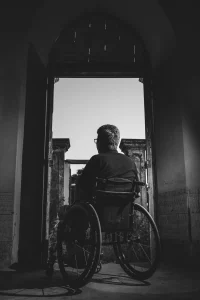Caring for disabled people can be difficult. It is important to understand their needs and allow
them to live independently. They don’t appreciate being treated with compassion and pity.
Taking care of disable people takes patience and time to understand their needs. You may need
to provide assistance for them for a long period of time before they are fully understood. It is a
good idea learn as much about your patient as possible before you begin to help them.
You will need to make sure your disabled loved one is safe whether you are a parent or
grandparent. Consider installing handrails at the stairs and in bathrooms. Be sure to stay in
touch with friends and relatives. Also, look for ways to get assistance from your local community.
Local organizations may offer assistance to people with disability support melbourne and may have volunteers.
You can also take advantage of respite care services or attend evenings of fun for disabled
people to have a break.

Caring for disabled people is a responsibility that takes more than just providing meals and
making sure they are comfortable. People with disabilities require constant attention and
frequent visits to their doctor. Even a simple exam can make a big difference in their quality life.
Just like their family members, disable people also need regular checkups. They also need you
to transport them to their doctor appointments. Your care will make a big difference in their lives.
You need to be able to care for a disabled person with dignity. Even if you don’t have any
experience, it is important to remember to take care of them. While caring for disabled people
can seem daunting, the right knowledge and training can make it easier. You can ensure that
your loved one receives the best care possible if you are willing to learn about their condition.
The first thing you should do when taking care of disable people is to learn about their condition.
It’s important to respect their needs and do your best to make them feel comfortable and happy.
Avoid using stereotypes as they can affect your language and cause misunderstandings of your
carer’s needs. Remember that they’ll appreciate your help more if you follow the directions they
give. If you don’t take care of them yourself, they’ll never get enough.
Find support groups to help you learn more about your disability. WILS offers support groups for
people with disabilities where members can share their experiences and encourage self-
advocacy. WILS also organizes educational sessions on disability-related issues and sexuality.
You can also ask for advice from WILS members in case you’re worried about how to care for
your loved one. You’ll also be able to ask for help from other caregivers who have been through
similar situations.
There are positive aspects of taking care of disabled people. These benefits include a greater
sense of psychological well-being. Some people find solace in spirituality. They see their child
with a disability both as a test and blessing. Stress can be caused by negative emotions and
resentment in a committed marriage. Understanding the caregiving aspect of caring for your
spouse is essential. If you don’t plan, you won’t know what you can expect.
While caring for disabled people can seem exhausting, there is help. Family and friends can help
you, as well as a healthcare provider. Many spouses with disabilities prefer to live at home.
However you may need to make some changes to their home so they can access it. Adaptive
equipment can be beneficial for both the spouse and caregiver. Consider all options and decide
the best way to provide care for your spouse with disabilities.
The study examined how families can care for disabled people in Tanzania. It is not possible to
do any specific research on this topic, but it does highlight the importance of extended family
members in caring for disabled persons. Parents usually take responsibility for their disabled
children. However, extended family members can sometimes help the parents. Other families felt
that the larger Tanzanian society and international community had an obligation towards the
disabled. This research provides a foundation for future research. There are also a number of
important perspectives on caring for disabled people.


